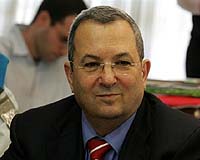| . |  |
. |
Jerusalem (AFP) Jan 18, 2011 Defence Minister Ehud Barak's defection from the Labour party has pushed the Israeli government rightward, to the probable detriment of peace efforts, analysts say. Britain's minister responsible for the Middle East warned Tuesday that Israel could find itself diplomatically isolated if peace efforts remained stalled. Barak's departure Monday allows him to keep his portfolio, but it prompted three Labour ministers who had pushed for the resumption of peace talks to resign from Prime Minister Benjamin Netanyahu's coalition government. "The coalition became more right wing as a result," the Yediot Aharonot daily wrote on Tuesday, saying Netanyahu was now considering bringing the far-right National Union party into the government. The paper said the biggest winner in the new political constellation was likely to be ultranationalist foreign minister Avigdor Lieberman and his Yisrael Beitenu party, whose 15 seats in the 120-member parliament are three times the number commanded by Barak's new "Independence" party. "(Lieberman's) bargaining power has increased, as well as the relative weight of his faction within the coalition," Yediot wrote. "If he decides that the 15 Yisrael Beitenu MPs are quitting the government, Netanyahu will be left with a coalition of 51, paving a short road to new elections." In a separate piece, Yediot commentator Nahum Barnea said the government had become a centre-right alliance in which Barak, whose portfolio gives him power over West Bank settlement-building, would be less able to resist pressure from the nationalist camp. "The settlers are going to eat him alive," Barnea wrote. "That is going to have an impact on the way foreign governments treat the government and Barak." Maariv daily's Ben Caspit said the government's peace policy would now centre on a form of transitional semi-statehood for the Palestinians, something the Palestinians have already dismissed as a non-starter. "Netanyahu himself is dying to rescue himself with an interim agreement, even if it calls for a Palestinian state with temporary borders, even if it includes a far-reaching pullout; the main thing is that it not include evacuation of settlements and that it does not touch Jerusalem," he wrote. "What are the chances that all this will happen?" Caspit asked. "Slim, almost zero." Netanyahu served notice on the Palestinians and the international community on Monday that Barak's move ensured his government would be the one with which they would have to do business for the foreseeable future. "The government was greatly strengthened today," he told senior members of his Likud party. "The whole world knows, and the Palestinians know too, that this government will be here in the years to come and it is with (this government) that negotiations must be conducted." Peace talks with the Palestinians collapsed in September over Israeli settlement-building in the West Bank and occupied east Jerusalem. Visiting British minister for the Middle East Alistair Burt told Israeli army radio on Tuesday he did not expect the new Israeli political reality to change much. "I think our perception at the moment is that the changes yesterday are unlikely to make a major difference to the process of the talks," he said. But continuation of the status quo, he warned, was liable to weaken Israel diplomatically. "There is understandably concern about a growing isolation of Israel," Burt said. "In the event that peace negotiations are not renewed Israel could find itself isolated." In December, the United States announced it had abandoned efforts to get Israel to renew a settlement freeze as an incentive to bring the Palestinians back into talks. Yediot Aharonot's veteran diplomatic writer Shimon Shiffer, citing an unnamed European ambassador, reportedly recently that US President Barack Obama had voiced "personal frustration" over his dealings with Netanyahu. Shiffer quoted "senior sources in Washington" as saying Obama planned to distance himself from US-mediated indirect peace talks, delegating the issue to his aide Dennis Ross and Middle East envoy George Mitchell. "What will happen on the ground is defined in Washington only as maintenance of the conflict, in the hope that things will not spin out of control," Shiffer wrote.
Share This Article With Planet Earth
Related Links
 Barak quits Labor to bolster Netanyahu
Barak quits Labor to bolster NetanyahuJerusalem (UPI) Jan 17, 2011 Israeli Defense Minister Ehud Barak's surprise defection from the Labor Party Monday cut the parliamentary majority of Prime Minister Binyamin Netanyahu's government but left the hard-line coalition in a stronger position. Barak and four of Labor's 13 legislators formed a new independent faction that will remain part of the coalition, with the ex-general remaining defense minister. ... read more |
|
| The content herein, unless otherwise known to be public domain, are Copyright 1995-2010 - SpaceDaily. AFP and UPI Wire Stories are copyright Agence France-Presse and United Press International. ESA Portal Reports are copyright European Space Agency. All NASA sourced material is public domain. Additional copyrights may apply in whole or part to other bona fide parties. Advertising does not imply endorsement,agreement or approval of any opinions, statements or information provided by SpaceDaily on any Web page published or hosted by SpaceDaily. Privacy Statement |